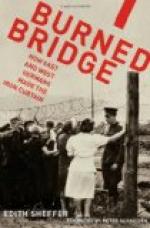“I’m pretty jumpy yet,” he said—but he did not explain why. He did not say he had been overseas. He did not mention the war. He talked of the coast, and timber, and fishing, and the adjacent islands, with all of which he seemed to be fairly familiar.
“I heard that recruiting sergeant tackle you this morning,” Thompson said at last. “You were standing almost beside my machine. What was it like over there?”
“What was it like?” the man repeated. He shook his head. “That’s a big order. I couldn’t tell you in six months. It wasn’t nice.”
He seemed to reflect a second or two.
“I suppose some one has to do it. It has to be done. But it’s a tough game. You don’t know where you’re going nor what you’re up against most of the time. The racket gets a man, as well as seeing fellows you know getting bumped off now and then. Some of the boys get hardened to it. I never did. I try to forget it now, mostly. But I dream things sometimes, and any sudden noise makes me jump. A fellow had better finish over there than come home crippled. I’m lucky to hold down a job like this, lucky that I happen to know gas engines and boats. I look all right, but I’m not much good. All chewed up with shrapnel. And my nerve’s gone. I wouldn’t have got my discharge if they could have used me any more. Aw, hell, if you haven’t been in it you can’t imagine what it’s like. I couldn’t tell you.”
“Tell me one thing,” Thompson asked quickly, spurred by an impulse for light upon certain matters which had troubled him. He wanted the word of an eye-witness. “Did you ever see, personally, any of those atrocities that have been laid to the Germans in Belgium?”
“Well, I don’t know,” the man replied. “The papers have printed a lot of stuff. Mind you, over there you hear about a lot of things you never see. The only thing I saw was children with their hands hacked off at the wrist.”
“Good God,” Thompson uttered. “You actually saw that with your own eyes.”
“Sure,” the man responded. “Nine of ’em in one village.
“Why, in the name of God, would men do such a thing?” Thompson demanded. “Was any reason ever given?”
“No. I suppose they were drunk or something. Fritz was pretty bad in spots, all right. Maybe they just wanted to put the fear of God in their hearts. A pal of mine in Flanders told me of a woman—in a place they took by a night raid—she had her breast slashed open. She said a Boche officer did it with his sword.”
The man spoke of these things in a detached, impersonal manner, as one who states commonplace facts. He had not particularly desired to speak of them. For him those gruesome incidents of war and invasion held no special horror. They might have rested heavily enough on his mind once. But he had come apparently to accept them as the grim collateral of war, without reacting emotionally to their terrible significance. And when Thompson ceased to question him he ceased to talk.




